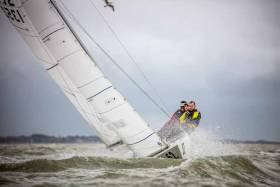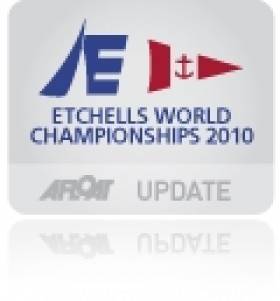Displaying items by tag: Etchells fleet
Stars Align for Jolly Roger at British Etchells Championships
The Etchells British Open and National Champion for 2019 is Jolly Roger sailed by Tom Abery, Bruno van Dyke, Matt Reid, Dom Mortimer and Quentin Bes Green. The 2019 Corinthian National Champion is Audrey sailed by Jon Warwick, Will Bedford, Adele Young and Will Heritage, who have all come through the Cowes Etchells Youth Programme. The first youth team at the championship was the Royal Dart YC team of Miles Jones, Fraser Woodley and James Homes.
“Racing in the Cowes Etchells fleet is pretty tough and very challenging. We never thought we would win it until we crossed the line in the last race. Thank you to all of the teams and see you next year!” commented Tom Abery. “That was a big weight off our shoulders, we have been trying to win this for nine years.” commented helm Bruno van Dyke. “Sometimes thing just go your way - the stars aligned.”
On the first day (Friday 01 November) the fleet sailed in 15-20 knots of breeze from the southwest, with gusty conditions testing boat handling skills. After three races Ante Razmilovic's Swedish Blue was a point ahead of Strait Dealer, helmed by Graham Sunderland. Jolly Roger was third. Swedish Blue got two great starts and showed impressive downwind speed to win the opening two encounters. Rob Goddard's Rocketman nailed the pin end to win the start of Race 3, but the race was won by Jolly Roger.
The second day of racing (Saturday 02 November) was a non-starter as a 50-knot front blasted into the Solent. The race committee, led by PRO Paul Jackson, called off racing for the day at 08:00 allowing the Cowes Etchells Fleet the opportunity to watch the Rugby World Cup Final. The Royal Ocean Racing Club provided a Full English Breakfast for an eager crowd, the fayre was more enjoyable than the result, especially if you were English!
Three races were held in a variety of conditions on the final day (Sunday 03 November). Race 4 was a light airs affair with a northerly gradient at the start. Kim Ridge's Colin was over-eager at the pin end and having been called OCS restarted some way behind the fleet. However, Colin, with Dog Palfrey on tactics, spotted a big lefty and recovered from their premature start to win Race 4. The penultimate race was held in building conditions with a big wind shift after the first lap. The race committee spotted the shift and changed the course axis to accommodate the 30-degree wind shift. As the breeze swung to the west, Jolly Roger came to the fore scoring their second bullet of the championship.
After a General Recall, Race 6 got away under the U-Flag. Three teams fell foul and were disqualified including Swedish Blue, effectively taking away any chance of victory in the championship. Jolly Roger showed impressive speed to take the gun and seal overall victory. Shaun Frohlich's Exabyte 7 won a close battle for second just pipping Strait Dealer to the line.
The Prize Giving was held at the Cowes Yacht Haven with Rob Goddard as master of ceremonies and Julia Bailey awarding the prizes for the 2019 Etchells British Open and National Championship. The ceremony included the announcement of the winner for the eight regatta series Champion of Champions, which was Rob Goddard's Rocketman. The Etchells Ice Bucket was won by Jon Warwick's Audrey.
BERTRAND WRAPS UP ETCHELLS WORLD TITLE
Australian sailing legend John Bertrand and his crew Andrew Palfry and Tom Slingsby wrapped up the 2010 Etchells World Championship title in some style at Howth (Saturday 28th) with his fifth bullet in eight races and without even needing to sail the final race of the Fingal County Council-sponsored series.
The Royal Brighton Yacht Club crew remained totally focused throughout the regatta and five firsts represented a stunning level of consistency at this level. Nearest rival Ante Razmilovic suffered gear problems before the start of the first race of the final day which forced them ashore to effect repairs. Fortunately for them, there was a general recall which gave them time to reach the re-start on time but they had a poor race to finish mid-fleet. With Bertrand taking line honours again, it was all over for the Royal Hong Kong YC team.
For Bertrand, it is the fulfilment of a dream to win a one-design class world championship to add to his Olympic bronze medal of 1976 and his famous America's Cup triumph 27 years ago. He practised on the race track for weeks before the event and his attention to detail was phenomenal, so the eventual outcome was the result of exceptional planning allied to technique, tactics and sheer sailing skill by the Aussie trio. Crewman Tom Slingsby had to forego the prize-giving dinner since he had to leave for the Laser Worlds at Hayling Island starting the next day.
In the morning race, Britain's Julia Bailey enjoyed the first beat, leading Bertrand around the top mark in a fresh 20-knot+ northerly but the Australians' superior downwind speed quickly saw that advantage wiped out. Bailey lost several places on the next leg and eventually finished 9th. Bertrand continued to stretch his lead while others swapped positions over the next two legs, with second place going to a very happy Tim Patton of Bermuda for his best result of the event. Jud Smith (Eastern YC/NYYC) and Peter Duncan (American YC) filled the next two places, with Smith the leading US entry in 7th overall going into the final race. Best of the Irish contingent was Howth's Laura Dillon on 'Lambay Rules' in 12th spot.
Irish eyes were smiling early and late in the final race, firstly with Jay Bourke of the Royal St.George YC heading the fleet around the windward mark followed closely by Peter Duncan of the USA and Howth's Dan O'Grady in 6th. By the leeward gate, another American Jud Smith had jumped from 7th to take the lead from Bourke, with O'Grady moving up another place. Smith held the lead to the finish, his win being the best score for a US team in an otherwise average week for American competitors. By the next windward mark, O'Grady had 3rd spot and by the finish, he had secured second place to record the best Irish result of the week. It was also sufficient to move O'Grady, with crewmen Peter Reilly and Owen Meade, up to 15th to finish top Irish boat of the championship, one place ahead of the Burrows family.
The new World Champion John Bertrand described the event as 'a superbly organised championship' and paid tribute to the Organising Committee chaired by Berchmans Gannon who was the first person to congratulate the Australians when they arrived back to the Howth marina. Throughout the Etchells Worlds, Howth Yacht Club provided comprehensive online coverage of the competition through live racing updates from the water via Twitter, provisional results posted online within 30 minutes of race finishes, and daily news updates with regular image and video posts.
The online coverage generated over 370,000 hits on the official Etchells Worlds website, with daily hits peaking at 59,194 for a single day. Australia, Great Britain and the USA provided the top number of hits although visitors identified from over 50 separate countries emphasized the worldwide demand for online coverage. Twitter helped incorporate the social networking element into the online coverage and the number of unique daily visitors to the Worlds website has grew by over 55% throughout the week.
Etchells World Championship – overall places:
1st John Bertrand/Andrew Palfry/Tom Slingsby (Australia) – 23 points 2nd Ante Razmilovic/Mike Wolfs/Chris Larson (Britain) – 35 points 3rd Damien King/Simon Cunnington/Andy Butler/James Ware (Australia) – 48 points 4th Eamonn O'Nolan/John Gimson/Kinley Fowler/Rachel Williamson (Britain) – 55 points 5th Jake Gunther/John Collingwood/Ben Morrison-Jack (Australia) – 55 points 6th Jud Smith/Kurt Winklemann/Brad Boston (USA) – 61 points






























































